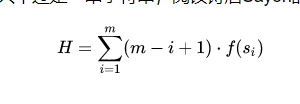Doki Doki Literature Club! is a visual novel developed by Team Salvato. The protagonist is invited by his childhood friend, Sayori, to join their high school's literature club. The protagonist then meets the other members of the club: Natsuki, Yuri, and the club president Monika. The protagonist starts to participate in the club's activities such as writing and sharing poetry, and grows close to the four girls. What a lovely story!
A very important feature of the game is its poetry writing mechanism. The player is given a list of various words to select from that will make up his poem. Each girl in the Literature Club has different word preferences, and will be very happy if the player's poem is full of her favorite words.

The poem writing mini-game (from wikipedia)
BaoBao is a big fan of the game and likes Sayori the most, so he decides to write a poem to please Sayori. A poem of words is nothing more than a sequence of strings, and the happiness of Sayori after reading the poem is calculated by the formula
where is the happiness and is Sayori's preference to the word .
Given a list of words and Sayori's preference to each word, please help BaoBao select words from the list and finish the poem with these words to maximize the happiness of Sayori.
Please note that each word can be used at most once!
Input
There are multiple test cases. The first line of input contains an integer (about 100), indicating the number of test cases. For each test case:
The first line contains two integers and (), indicating the number of words and the length of the poem.
For the following lines, the -th line contains a string consisting of lowercased English letters () and an integer (), indicating the -th word and Sayori's preference to this word. It's guaranteed that for all .
Output
For each test case output one line containing an integer and strings separated by one space, indicating the maximum possible happiness and the corresponding poem. If there are multiple poems which can achieve the maximum happiness, print the lexicographically smallest one.
Please, DO NOT output extra spaces at the end of each line, or your answer may be considered incorrect!
A sequence of strings is lexicographically smaller than another sequence of strings , if there exists a () such that for all and is lexicographically smaller than .
A string is lexicographically smaller than another string , if there exists a () such that for all and , or for all and .
Sample Input
4 10 8 hello 0 world 0 behind 0 far 1 be 2 spring 10 can 15 comes 20 winter 25 if 200 5 5 collegiate 0 programming -5 zhejiang 10 provincial 5 contest -45 3 2 bcda 1 bcd 1 bbbbb 1 3 2 a 1 aa 1 aaa 1
Sample Output
2018 if winter comes can spring be far behind 15 zhejiang provincial collegiate programming contest 3 bbbbb bcd 3 a aa
原题地址:http://acm.zju.edu.cn/onlinejudge/showContestProblem.do?problemId=5761
题意:
给N个单词,让你从中选出M个单词选出组成一个句子使得这个句子通过指定的算式计算获得的值最大,并输出最终的句子,如果值相同输出字典序最小的句子
思路:
仔细看上面算式发现这个算式需要值大的在前面才能满足最大值并且字典序最小也提醒我们需要用到排序
代码:
#include<bits/stdc++.h> using namespace std; typedef long long ll; int a[5000000]; int b[5000000]; struct node{ ll num; string str; }; int cmp(node a,node b){ //按照要求排序 if(a.num==b.num)return a.str<b.str; else return a.num>b.num; } int main() { std::ios::sync_with_stdio(false); int t; cin>>t; while(t--){ int n,m; cin>>n>>m; map<string,ll>mp; vector<node>ve; string ss; ll maxnum; //注意这个longlong 这题就是因为这个精度wa了搞得我后面运用了去重又wa一次 for(int i=1;i<=n;i++){ cin>>ss>>maxnum; if(mp[ss]){ if(mp[ss]<maxnum){ mp[ss]=maxnum; } } else{ mp[ss]=maxnum; } } map<string,ll>::iterator it; //去掉重复的单词,相同的单词保留值最大的单词 for(it=mp.begin();it!=mp.end();it++){ node now; now.str=it->first; now.num=it->second; ve.push_back(now); } sort(ve.begin(),ve.end(),cmp); ll sum=0; for(int i=1;i<=m;i++){ ll cnt=ve[i-1].num; sum+=(m-i+1)*cnt; } cout<<sum<<" "; for(int i=0;i<m;i++){ cout<<ve[i].str; if(i==m-1)cout<<endl; else cout<<" "; } } return 0; }